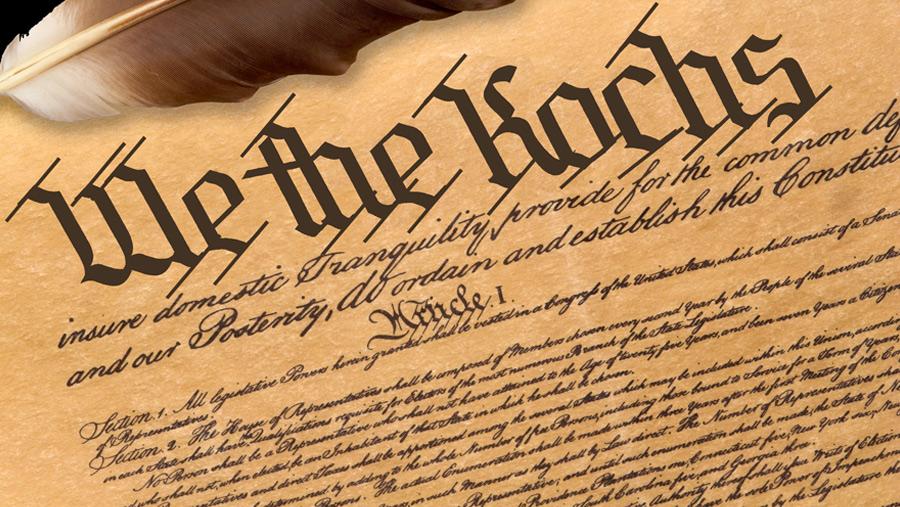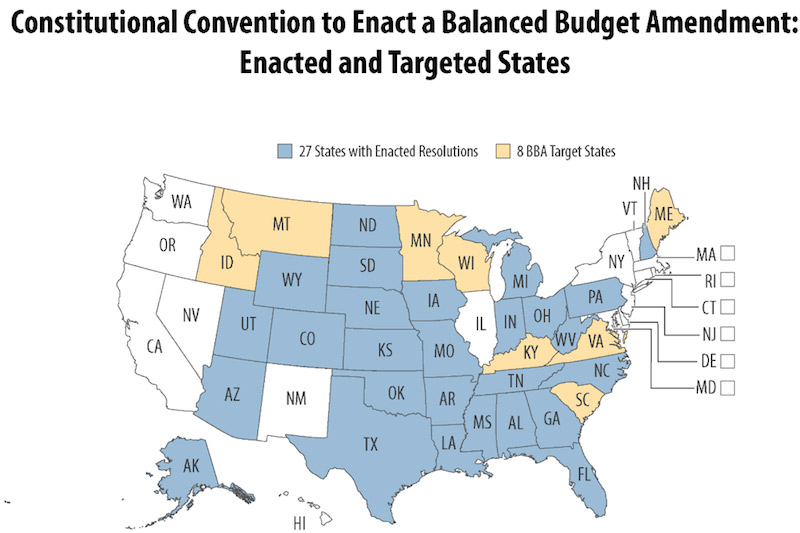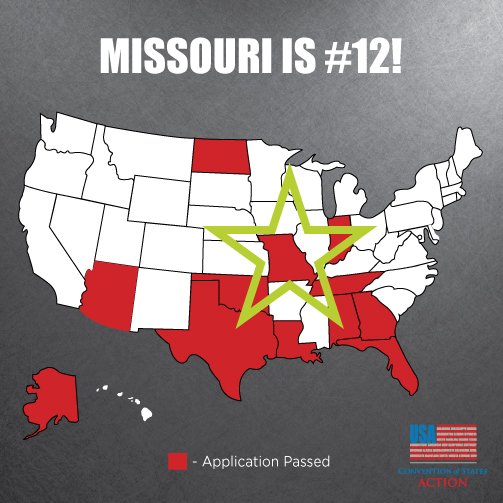Submitted by Arn Pearson on

This year's legislative season saw a strong push in the states from right-wing groups, bankrolled by the Koch brothers and other ultra-conservative billionaires, hoping to convene a national constitutional convention in order to inject rigid fiscal constraints into our country's founding document. Advocates of a federal "balanced budget amendment" (BBA) picked up two more states, Wyoming and Arizona, in their drive to win the 34 resolutions needed to bypass Congress and convene a convention to propose changes to the U.S. Constitution.
That momentum, however, was blunted by surprisingly successful campaigns to rescind convention calls in three states, New Mexico, Maryland, and Nevada. As a result, BBA proponents now claim 27 states in their column, down from 28 at the beginning of the year.
Two steps forward and three steps back…from the brink of a political experiment untried since 1787.
Under Article V of the Constitution, amendments can be proposed either by two-thirds of both the House and Senate, or through a convention called for by two-thirds of state legislatures (currently 34 states). After adoption at a convention, any amendment must be ratified by three-fourths of the states (currently 38 states) before it can become part of the Constitution.
While amendments proposed by Congress have been adopted 17 times since the Constitution's ratification, a constitutional convention has never been called. Critics of this approach, from the Left and the Right, are concerned about how such a convention would play out in this era of massive political spending by billionaires and corporations, especially since there is nothing in Article V limiting the scope of a convention once called.
BBA momentum stalls
 Backers of a balanced budget amendment convention set their sights on at least seven red states this year, but of those, Wisconsin is the only one still in play, with an Assembly vote scheduled for June 14. Growing opposition resulted in the hard-fought defeat of a BBA resolution in Idaho and the tabling of a similar measure in Kentucky.
Backers of a balanced budget amendment convention set their sights on at least seven red states this year, but of those, Wisconsin is the only one still in play, with an Assembly vote scheduled for June 14. Growing opposition resulted in the hard-fought defeat of a BBA resolution in Idaho and the tabling of a similar measure in Kentucky.
More than 200 organizations, including the Center for Media and Democracy, signed onto a letter in April 2017 denouncing an Article V convention at this time as "a dangerous threat to the U.S. Constitution, our democracy, and our civil rights and liberties."
In addition, three legislatures rescinded prior convention calls, following Delaware's lead last year. As a result, the number of states with BBA convention calls has dropped by one; passage in Wisconsin would make the year a wash.
The groups behind the convention drive are disappointed but undeterred, and have targeted at least seven states for 2018, (Kentucky, Maine, Minnesota, Montana, South Carolina, Virginia, and Washington).
"With tremendous momentum led by ALEC and other arch-conservative organizations, we started 2017 expecting to see Article V resolutions pass in many states," said Common Cause campaign strategist Jay Riestenberg. "Instead, in this dangerous period of divisive politics, we saw bi-partisan cooperation in several states to protect the Constitution."
"While three states took action to protect our Constitution by rescinding Article V convention resolutions, wealthy special interest groups are still dangerously close to calling a convention that would put everyone's constitutional rights and protections up for grabs," Riestenberg said.
All of the bills are closely tailored to model measures being promoted by the Koch-backed American Legislative Exchange Council (ALEC) and Balanced Budget Amendment Task Force. Funded and controlled by large corporations, including Koch Industries, ExxonMobil, telecom, and tobacco companies, ALEC has supported a BBA since 1995 and renewed its push for a constitutional convention in recent years, publishing an Article V convention handbook for legislators and hosting numerous strategy sessions.
BBA advocates cite "common sense" concerns about "fiscal responsibility," but the rhetoric masks the outright hostility that the Kochs and other billionaire backers have for key federal programs like Social Security, Medicare and Medicaid, and for the regulatory infrastructure that protects consumers and the environment. Prominent economists warn that such an austerity amendment--which would constrain discretionary spending but not tax giveaways for corporations and the wealthy--would have catastrophic results during economic downturns and cripple the federal government's ability to aid states as they deal with the severe impacts of climate change.
More radical measures gain momentum
 Meanwhile, a faction of the Article V convention crowd seeking a much more radical rewrite of the Constitution made significant gains in 2017. The "Convention of States" (COS) project, run by the Texas-based Citizens for Self Governance, introduced wide-ranging resolutions calling for a broad convention to limit the powers of the federal government in 24 states and won passage in four, Arizona, Missouri, North Dakota, and Texas.
Meanwhile, a faction of the Article V convention crowd seeking a much more radical rewrite of the Constitution made significant gains in 2017. The "Convention of States" (COS) project, run by the Texas-based Citizens for Self Governance, introduced wide-ranging resolutions calling for a broad convention to limit the powers of the federal government in 24 states and won passage in four, Arizona, Missouri, North Dakota, and Texas.
COS, whose budget more than tripled between 2011 and 2015 to $5.7 million, now has a total of 12 states behind its more unlikely, but more dangerous, approach. The group, founded by Tea Party Patriots founder Mark Meckler and Koch-tied dark money man Eric O'Keefe, has received major support from the Koch-linked Donors Trust and backing from ALEC, which has adopted COS’s proposal as a "model" bill. It seeks a constitutional convention to pass any number of amendments designed to limit the powers of the federal government, adopt term limits, and allow states to opt-out of regulations and even Supreme Court decisions they do not like.
The COS strategy, if successful, would radically revise the Constitution's structure of state and federal power sharing in a way that goes to the heart of what it means to be "united states." Most of the states that have passed Convention of State resolutions are in the deep south, prompting some critics to call it the "New Confederacy."
Max Abbott contributed to this article.


Comments
MJ Alexander replied on Permalink
Convention of States
Michelle Davis replied on Permalink
The Federal Gov't is out of control
John Doe replied on Permalink
Federal Government is out of Control
Carol Menges replied on Permalink
COS Project
John De Herrera replied on Permalink
Bogus Fears
Darryl Phillips replied on Permalink
Not Bogus Fears
Emma replied on Permalink
Not bogus fears
Brandon James replied on Permalink
Hyperpartisan
Bill Walker replied on Permalink
Things are getting interesting
Alexander Reagan replied on Permalink
Article V Constitutional Convention
Pages